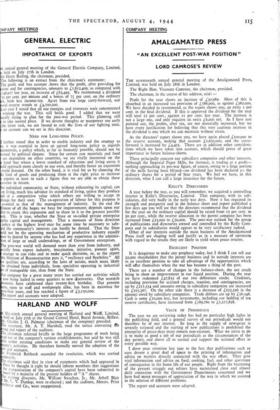MPANY MEETINGS
GENERAL ELECTRIC
IMPORTANCE OF EXPORTS E annual general meeting of the General Electric Company, Limited, s held on July 27th in London.
it Harry Railing, the chairman, presided.
he following is an extract from the chairman's statement: e profit and loss account chows that the profit, after providing for ation and for contingencies,,amounts to £1,812,4129;as compared with 748,917 last year, an increase of £63,492. We recommend a dividend to per cent. per annum and a bonus of 7/ per cent. on the ordinary k, both less income-tax. Apart from our large carry-forward, our eral reserve stands at .£4,7oo,000. , ast year I stated that all our energies and resources were concentrated winning the war. This still holds good. I added that we were urally trying to plan for the post-war period. This planning still to take second place. If we devote thoughts or manpower too early the latter task, we are bound to risk the lives of our fighting men. no account can we err in this direction.
NEED FOR LONG-TERM POLICY.
further stated that in order to enable industry and the country to , it was essential to have an _agreed long-term policy as regards damentals, a policy which, as far as humanly possible, should not be 'erned by political slogans. Since for certain raw materials and food are dependent on other countries, we are vitally interested on the hand that where a lower standard of education and living exists it uld approach more closely to our own, and thereby foster an expansion world demand. On the other hand, it is vital for us by choosing the t kind of goods and producing them at the right price to increase exports at least to such a figure that we are able to obtain these essities in return.
o individual community, or State, without exhausting its capital, can on living, much less advance its standard of living, unless they produce at a competitive value which others are willing to accept in ange for their own. The co-operation of labour for this purpose is essential as that of the management of industry. In the end the ment of all the hopes we have for improvements depends upon our ay to create this expansion and to share in it to the greatest possible nt. This is true, whether the State or so-called private enterprise plies capital and management. That a measure of State direction policy at the highest level may for some time be necessary to 'safe- d the community's interests can hardly be denied. That the State uld not be the operating mechanism of productive industry equally of be denied by anyone who has had any experience in the adminis- on of large or small undertakings, or of Government enterprises.
e post-war world will demand more than ever from industry, and Tally from export industry, imagination, initiative, pioneer spirit, courage to run risks and to make quick decisions, or, as the report he Minister of Reconstruction puts it, " resiliency and flexibility." All e qualities are, according to the laws of nature, much more likely be obtained from individuals, from specialists operating in industrial s of manageable size, than from the State.
ur company for a great many years has carried out activities which now being hailed in some quarters as new discoveries. Our research ratories have celebrated their twenty-first birthday. Our pension e, open to staff and workpeople alike, has been in existence for ty-four years, and has reached a figure of L3,150s000.
e report and accounts were adopted.


























 Previous page
Previous page